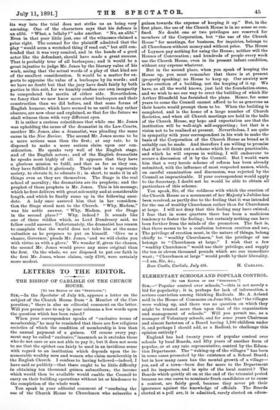LETTERS TO THE EDITOR.
THE BISHOP OF CARLISLE ON THE CHURCH HOUSE.
[To THE EDITOR OF THE "SPECTATOR../ SIR,—In the Spectator of July 4th, appears a letter on the subject of the Church House from "A Member of the Corp poration ; " there is also an editorial comment on the letter. Will you permit me to say in your columns a few words upon the question which has been raised?
When your correspondent speaks of "exclusive terms of
membership," he may be reminded that there are few religious societies of which the condition of membership is less than the annual payment of a guinea. Of course every pay- ment may be called "exclusive," inasmuch as it excludes those who do not care or are not able to pay it; but it does not seem to me that the epithet can fairly be used in an invidious sense with regard to an institution which depends upon the in- numerable wealthy men and women who claim membership in the English Church. I confess to having believed—indeed, I have said so publicly—that there ought to be little difficulty in obtaining ten thousand guinea subscribers; the income which would then be available would enable the Council to carry on their building operations without let or hindrance to the completion of the whole work.
You speak in your editorial comment of "confining the nie of the Church House to Churchmen who subscribe a,
guinea towards the expense of keeping it up." But, in the first place, the use of the Church House is in no sense so con- fined. No doubt one or two privileges are reserved for members of the Corporation, but "the use of the Church House" for meetings, for business, for inquiries, belongs to all Churchmen without money and without price. The House of Laymen pay nothing for using the House; neither will the Houses of Convocation ; and hundreds of people every week use the Church House, even in its present infant condition, without any expense whatever.
But in the second place, when you speak of keeping the House up, you must remember that there is at present (properly speaking) no House to keep up. Our anxiety now is the erection of a building, not the keeping of it up. We have, as all the world knows, just laid the foundation-stone, and we wish to see our way to erect the building of which Sir Arthur Blomfield has furnished the plans. Hence, for some years to come the Council cannot afford to be as generous as their hearts would prompt them to be. When the building is completed, and is the home of a large number of Church Societies, and when all Church meetings are held in the halls of the Church House, my hope and expectation are that the institution will be well-nigh self-supporting ; but that is a vision not to be realised at present. Nevertheless, I am quite in sympathy with your correspondent in his wish to make the basis of the Corporation of the Church House as broad as it suitably can be made. And therefore I am willing to promise that if he will think out a scheme which he deems practicable, and which he will express in writing, I will endeavour to secure a discussion of it by the Council. But I would warn him that a very heroic scheme of reform has been already submitted, with the influence of most respected names, which, on careful examination and discussion, was rejected by the Council as impracticable. If your correspondent would apply to the Secretary, I doubt not he would be able to obtain all particulars of this scheme.
You speak, Sir, of the coldness with which the erection of the Church House as a monument of her Majesty's Jubilee has been received, as partly due to the feeling that it was intended for the use of wealthy Churchmen rather than for Churchmen at large. I will not deny that this feeling may have existed; I fear that in some quarters there has been a malicious tendency to foster the feeling; but certainly nothing can have been further from the minds of the promoters. The fact is, that there seems to be a confusion between erection and use, The privilege of erection must, in the nature of things, belong chiefly to "wealthy Churchmen," but the privilege of use belongs to "Churchmen at large." I wish that a few "wealthy Churchmen" would use their privilege, and supply the ten or eleven thousand pounds which are our immediate want; "Churchmen at large" would profit by their liberality. —I am, Sir, &c.,
Rose Castle, Carlisle, July 6th. H. CARLIOL.


































 Previous page
Previous page